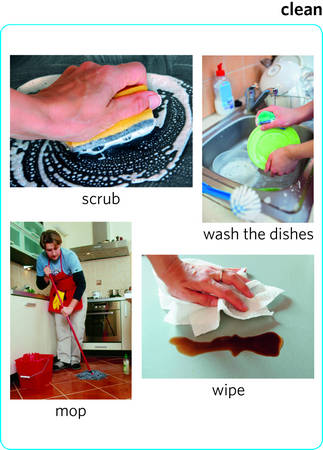adjective | verb
cleanclean1 /klin/ adjective ► clean not dirty: She always keeps the house very clean. He changed into some clean clothes.
► spotless if a place or a piece of clothing is spotless, it is completely clean and has no dirty marks, especially because someone carefully cleans it: Her kitchen is always spotless.
► immaculate (formal) so clean and neat that something seems perfect: The tables were covered with immaculate white tablecloths. The house was immaculate.
► pure pure air or water is clean and does not have anything harmful in it: The water in the stream is pure and safe to drink.
► sterile completely clean and having no bacteria so that something is safe to use in medicine or science: The nurse put a sterile bandage on the wound.
► hygienic clean so that people will not get diseases. Hygienic is used about keeping your body clean or keeping food, kitchens, and bathrooms clean: The cows must be milked in hygienic conditions for the milk to be sold.
► sanitary clean and not likely to cause diseases, especially diseases caused by body waste. Sanitary is used especially about keeping bathrooms clean and having clean systems for removing waste: I keep the kitchen and bathroom sanitary, but otherwise I don’t do much housework. The campground has good sanitary facilities (=bathrooms).
ANTONYMS ➔ see dirtyADVERBS: cleanYou can make the adjectives spotless and immaculate into adverbs by using an -ly ending: Her kitchen is spotlessly clean. | The house is beautifully decorated and immaculately clean. adjective | verb
cleanclean2 /klin/ verb 1  to make something clean► clean
to make something clean► clean to make something clean: Your shoes need cleaning. I clean the windows once a month.
► clean up to make a place completely clean and neat, by putting things into the correct places and cleaning: It took all morning to clean up the apartment.
► wash to clean something using lots of water and usually soap. You use wash especially about clothes, dishes, parts of your body, and uncooked food: Wash your hands before dinner.
► wipe to remove dirt, water, etc. from something by moving a wet cloth or your hand across it: Don’t forget to wipe the countertops once you’ve finished washing the dishes.
► dust to clean the dust (=very small pieces of dirt) off furniture and objects with a cloth: Could you dust the living room, please?
► scrub to clean something by rubbing it hard with a brush or cloth and soap and water: She was on her knees scrubbing the kitchen floor.
► mop to clean the floor with a wet mop. A mop is a tool with a long handle and a soft part that you put into water: She was mopping the floor in the kitchen.
➔ see sweep2 to make something completely clean so that it has no germs or bacteria► cleanse to make something completely clean, especially in order to get rid of germs or other things that are bad for you: He cleansed the cut with soap and water.
► disinfect to clean something with a chemical that kills bacteria: Disinfect the toilet regularly.
► sterilize to make something, for example a medical tool, completely clean and kill all bacteria in or on it. You usually use high temperatures or chemicals to sterilize things: It is very important to sterilize baby bottles to keep your baby healthy.
► purify to remove the dirty parts from something such as water or air, and usually to kill any bacteria in it: To purify drinking water when you are camping, either boil the water or add a special tablet to it.
➔ see wash